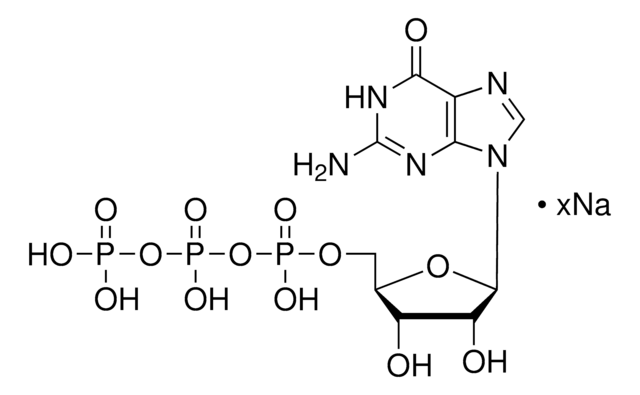I1643
Pyrophosphatase, Inorganic from baker′s yeast (S. cerevisiae)
powder, ≥500 units/mg protein (E1%/280)
Sinônimo(s):
Inorganic Pyrophosphatase, Pyrophosphate phosphohydrolase
Faça loginpara ver os preços organizacionais e de contrato
About This Item
Produtos recomendados
Formulário
powder
Nível de qualidade
atividade específica
≥500 units/mg protein (E1%/280)
peso molecular
71 kDa
temperatura de armazenamento
−20°C
Procurando produtos similares? Visita Guia de comparação de produtos
Descrição geral
Molecular Weight: 71 kDa (homodimer consisting of two equal subunits of molecular weight 32-35 kDa)
Extinction Coefficient: E1% = 14.5 (280 nm)
pI: 4.75
This ubiquitous enzyme serves to drive metabolic reactions that produce pyrophosphate, since these reactions typically have equilibrium constants near unity. The catalytic mechanism has been described in the literature. Inorganic pyrophosphatase is a metalloprotease that requires Mg2+ for maximal activity. Although the hydrolysis of inorganic pyrophosphate is specific in the presence of Mg2+, both ADP and ATP can be hydrolyzed if zinc is present.
Extinction Coefficient: E1% = 14.5 (280 nm)
pI: 4.75
This ubiquitous enzyme serves to drive metabolic reactions that produce pyrophosphate, since these reactions typically have equilibrium constants near unity. The catalytic mechanism has been described in the literature. Inorganic pyrophosphatase is a metalloprotease that requires Mg2+ for maximal activity. Although the hydrolysis of inorganic pyrophosphate is specific in the presence of Mg2+, both ADP and ATP can be hydrolyzed if zinc is present.
Aplicação
Inorganic pyrophosphatase (PPase) is a ubiquitous enzyme catalyzing the reaction PPi + H2O → 2Pi.
It plays an important role in protein, RNA, and DNA synthesis.
It plays an important role in protein, RNA, and DNA synthesis.
Pyrophosphatase has been used:
- as a component of the reaction buffer used in aminoacylation assay to quantify incorporation of [3H]L-methionine into tRNA.
- as a component of PCR mixture.
Pyrophosphatase has been used:
as a component of the reaction buffer used in aminoacylation assay to quantify incorporation of [3H]L-methionine into tRNA.
as a component of PCR mixture
as a component of the reaction buffer used in aminoacylation assay to quantify incorporation of [3H]L-methionine into tRNA.
as a component of PCR mixture
Definição da unidade
One unit will liberate 1.0 μmole of inorganic orthophosphate per min at pH 7.2 at 25 °C.
forma física
Lyophilized powder containing 80-90% buffer salts
Código de classe de armazenamento
11 - Combustible Solids
Classe de risco de água (WGK)
WGK 3
Ponto de fulgor (°F)
Not applicable
Ponto de fulgor (°C)
Not applicable
Equipamento de proteção individual
Eyeshields, Gloves, type N95 (US)
Escolha uma das versões mais recentes:
Já possui este produto?
Encontre a documentação dos produtos que você adquiriu recentemente na biblioteca de documentos.
Virginia P Ronchi et al.
The Journal of biological chemistry, 292(44), 18006-18023 (2017-09-20)
To understand the mechanism for assembly of Lys
Enzymatic chemiluminescence assay for inorganic pyrophosphate.
Vuokko Jansson et al.
Analytical biochemistry, 304(1), 135-137 (2002-04-24)
Laura Pedró-Rosa et al.
Journal of biomolecular screening, 20(1), 122-130 (2014-08-29)
Improved therapies for the treatment of Trypanosoma brucei, the etiological agent of the neglected tropical disease human African trypanosomiasis, are urgently needed. We targeted T. brucei methionyl-tRNA synthetase (MetRS), an aminoacyl-tRNA synthase (aaRS), which is considered an important drug target
Jin He et al.
Annals of neurology, 93(2), 244-256 (2022-09-12)
Despite the increasing number of genes associated with Charcot-Marie-Tooth (CMT) disease, many patients currently still lack appropriate genetic diagnosis for this disease. Autosomal dominant mutations in aminoacyl-tRNA synthetases (ARSs) have been implicated in CMT. Here, we describe causal missense mutations
Yibo Li et al.
Nature genetics, 46(4), 398-404 (2014-03-19)
Grain chalkiness is a highly undesirable quality trait in the marketing and consumption of rice grain. However, the molecular basis of this trait is poorly understood. Here we show that a major quantitative trait locus (QTL), Chalk5, influences grain chalkiness
Nossa equipe de cientistas tem experiência em todas as áreas de pesquisa, incluindo Life Sciences, ciência de materiais, síntese química, cromatografia, química analítica e muitas outras.
Entre em contato com a assistência técnica





